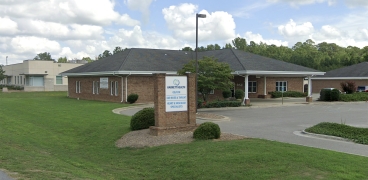Welcome to our Heart & Vascular Center. Here, expert care meets the challenges of heart failure.
What is Heart Failure?
Heart failure includes right and left-sided heart failure, as well as congestive heart failure, conditions affecting how your heart pumps blood. Left-sided failure mainly affects the heart's ability to pump blood to the body, and right-sided failure impairs blood flow to the lungs. In certain instances and based on the severity, this can also include congestive heart failure (CHF). All are influenced by a range of health conditions and lifestyle choices. Early diagnosis and management are crucial for both.
Left-Sided Heart Failure
In left-sided heart failure, the left ventricle struggles to pump blood to the body. This can make the heart stiff and less efficient.
Two types exist: Heart failure with reduced ejection fraction (HFrEF) and with preserved ejection fraction (HFpEF). HFrEF means the heart can't contract properly. HFpEF happens when the heart muscle is too stiff to fill properly.
Common causes include:
- High blood pressure
- Diabetes
- Coronary artery disease
- Obesity and lack of exercise
Certain heart conditions such as aortic stenosis and hypertrophic cardiomyopathy also contribute.
Right-Sided Heart Failure
Right-sided heart failure, in contrast, occurs when the right ventricle can't effectively pump blood to the lungs. It often results from left-sided failure but can also arise independently due to lung diseases or heart valve issues.
Both types share symptoms such as fatigue, shortness of breath and swelling in the legs and abdomen. However, right-sided may also cause fluid buildup in the abdominal organs.
Congestive Heart Failure
Congestive heart failure (CHF) is a serious condition where the heart doesn't pump blood as effectively as it should.
It doesn't mean the heart has stopped working; instead, the heart muscle becomes weaker or faces mechanical issues. This hinders its ability to fill with blood or contract properly. This leads to poor blood flow to the body's organs.
The heart tries to compensate by beating faster or enlarging to hold more blood. However, this extra effort can cause palpitations and over time, leads to less blood circulation.
The lungs may fill with fluid, causing shortness of breath. Also, inadequate blood flow to the kidneys can cause them to retain water and sodium, potentially leading to kidney failure. Unfortunately, CHF is often progressive and worsens over time.
Heart Failure Symptoms
Left-sided heart failure symptoms:
- Chest pain
- Fatigue and weakness
- Shortness of breath, especially with activity or when lying down
- Fast or irregular heartbeat
- Swollen feet, ankles and legs
- Unexplained weight gain
- Persistent cough or wheezing
- Increased nighttime urination
Right-sided heart failure symptoms:
- Swelling in feet, ankles, legs and sometimes abdomen
- Fatigue and weakness
- Shortness of breath
- Nausea and loss of appetite
- Rapid weight gain from fluid retention
- Increased nighttime urination
- Distended neck veins
- Liver enlargement or pain
Congestive heart failure symptoms:
- Shortness of breath, especially during activity or when lying down
- Persistent coughing or wheezing with white or pink blood-tinged phlegm
- Swelling in the legs, ankles and feet
- Tiredness and fatigue
- Rapid or irregular heartbeat
- Reduced ability to exercise
- Sudden weight gain from fluid retention
- Nausea or lack of appetite
- Swelling in the abdomen
Go to the Emergency Department if:
- You have severe shortness of breath or chest pain
- Experience fainting or severe weakness
Heart Failure Diagnosis at Cape Fear Valley Health
At our Heart & Vascular Center, diagnosing right- or left-sided heart failure begins with understanding your symptoms and medical history. We conduct a comprehensive physical examination to identify signs such as swelling or irregular heartbeat.
Key tests include an echocardiogram, which assesses heart function and structure, particularly the ventricles' ability to pump and fill with blood. We measure ejection fraction to determine heart failure type: reduced (HFrEF) or preserved (HFpEF) ejection fraction.
Blood tests check for markers indicating heart stress or damage.
A chest X-ray helps visualize heart size and detect fluid buildup.
For more specific insights, we might use a cardiac MRI or CT scan to get detailed heart images.
If coronary artery disease is suspected, a coronary angiogram can identify blockages affecting heart function.
In some cases, a cardiac catheterization provides detailed information about heart chamber pressures and function.
Our experienced cardiologists are equipped with advanced diagnostic tools. This allows them to tailor the evaluation process to your unique symptoms and health status, ensuring a comprehensive diagnosis.
Heart Failure Treatment at Cape Fear Valley Health
At Cape Fear Valley Heart & Vascular Center, treating right- or left-sided heart failure involves a personalized approach tailored to each patient's needs. For both types, managing underlying conditions such as high blood pressure or diabetes is crucial.
Medications play a key role:
- Diuretics reduce fluid overload
- ACE inhibitors or ARBs control blood pressure
- Beta-blockers manage heart rate
For left-sided heart failure, treatment focuses on improving the heart's pumping efficiency. This might involve SGLT2 inhibitors like Jardiance (empagliflozin), which have proven benefits in heart failure management.
Heart failure devices, such as pacemakers or defibrillators, may be necessary for some patients, especially those with rhythm abnormalities.
Lifestyle changes, including diet modifications, exercise and quitting smoking, are integral to treatment. We also provide educational resources and support groups to help you manage your condition effectively.
In cases of advanced heart failure, we explore options such as specialized surgical procedures.
Our multidisciplinary team includes cardiologists, surgeons and other specialists. They work together to provide comprehensive care, ensuring the best possible outcomes for your heart health.





